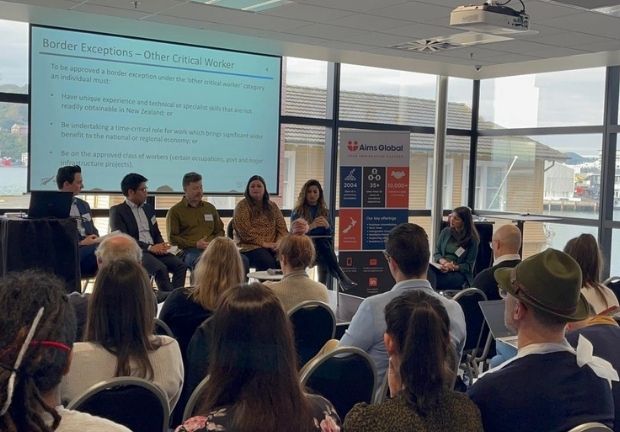2021 Resident Visa - Consider These 5 Business Outcomes
07 October 2021Since last week’s announcement by Immigration Minister Kris Faafoi, we have been inundated with information regarding the new 2021 Resident Visa. With so much information available, it can be hard for employers to understand the ramifications of this new visa on their migrant workforce!
Rather than get bogged down by the specific eligibility requirements of this visa, or delve into the detailed FAQs that potential visa applicants may be asking - we have outlined what matters most - the five outcomes this 2021 Resident Visa will elicit for your business.
1. Eligible vs Ineligible - Employees Will Behave Differently
Up to 165,000 migrants in NZ will be able to apply for this residence visa, so it is critical you understand which of your employees are able to move forward on this pathway to residence. If they are eligible - not only will these employees feel less anxious about their future in NZ, but they will be able to become more settled in their current employment as well.
However, for your employees who are ineligible for this visa - especially if due to a minor reason such as being in NZ for a couple of days less than the required number - there may be an emotional impact.
Be aware that uncertainty will remain, your employees’ mental health may be affected and their productivity may decrease. Do what you can to manage the emotional impact across your organisation.
2. If Ineligible - Residence Through SMC Will Be Your Employees’ Top Priority
For those who do not meet the eligibility requirements for this new 2021 Resident Visa, as of now their only pathway to residence will be the Skilled Migrant Category (SMC), which we still have not received an update on.
Where the 2021 Resident Visa seems to have clear-cut requirements, the SMC pathway to residence does not - which means not only will your employees still be feeling anxious about this less certain pathway, but they may also have to make employment decisions based on their end goal of NZ residency (such as seeking employment outside of Auckland in order to garner more ANZSCO points).
3. If Eligible - Your Impact on the “Skilled” Criteria
When it comes to the “Skilled, Scarce, or Settled” section of the 2021 Resident Visa requirements, your employee must meet at least one of the three. So if your employee does not work in a role on an eligible scarce list, nor have they been settled in NZ for the majority of the previous three years, then the employee meets neither the “Scarce” nor the “Settled” criteria.
Therefore, in order to apply for this visa, your employee must meet the “Skilled” requirement. To do so, they must have earned at or above the median wage ($27/hour) on 29/09/2021, as well as on whatever future date that they submit their resident visa application.
If they didn’t earn at or above $27/hour on 29th September 2021, then unfortunately they are unable to qualify for the “Skilled” component of this visa.
However if they did earn at or above median wage on 29/09/2021, then their hourly wage must remain at least this high until they submit their 2021 Resident Visa application (July 2022 at the latest).
4. Employees Must Hold Valid Work Visas at All Times
Despite the happiness and excitement that your eligible employees may be feeling, it is important that neither your employees - nor you as their employer - lose sight of the fact that even with their residencies on the way, every migrant in NZ must hold a valid visa for the entire duration of their time in NZ. This means it is critical that they hold a current work visa until their residence is approved.
It may be easier to simply assume that this is the responsibility of your individual employees - that isn’t actually the case. It is the obligation of you as an NZ employer to ensure that you don’t hire or employ anyone who doesn’t hold an appropriate and current work visa. If you fail to do so, this visa breach could affect your ability to retain and hire migrants in the future.
5. Don’t Lose Sight of Rapidly Approaching Policy Changes
It may seem as though the sailing will be smooth for the immediate future, but you have to be cautious as we are still waiting for additional information and clarification from INZ on different aspects of the 2021 Resident Visa.
By the time applications close for this visa on 31 July 2022, the mandatory accreditation for employers is likely to be open. This will see the onus of complying with immigration policies shift to employers, forcing them to take the initiative ahead of any additional employer accreditation changes. Thus, do not lose sight of the upcoming employer accreditation process - the new employer accreditation system will be here sooner than you think.
Learn More - What Do These Changes Mean for You?
In order to better understand the impact of these new and incoming policies on recruiting, hiring and supporting a migrant workforce, we invite you to join us for a webinar on 20 October 2021 from 12 - 1pm: Immigration, Border, Skill Shortage: What’s Next for Employers & Recruiters?
In partnership with RCSA (Recruitment, Consulting & Staffing Association of Australia & NZ), and joined by industry experts from Immigration New Zealand and the Auckland Business Chamber, we will discuss:
- How you can leverage this 2021 Resident Visa as a retention strategy
- How changes to the border settings could impact the current talent shortage
- What the future holds for migrant workers in NZ
- Practical steps to take to prepare for the challenges ahead

.png)


